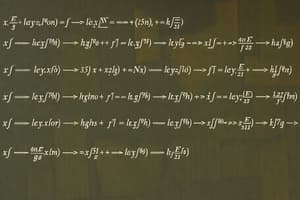Podcast
Questions and Answers
What is one major advantage of the analytic method in teaching mathematics?
What is one major advantage of the analytic method in teaching mathematics?
- It develops the ability to memorize facts quickly.
- It helps in solving problems independently. (correct)
- It provides immediate solutions to problems.
- It is particularly suitable for younger children.
Which of the following statements correctly describes the synthesis method?
Which of the following statements correctly describes the synthesis method?
- It is a method that primarily involves group discussions.
- It requires extensive prior knowledge before application.
- It focuses solely on memorization techniques.
- It combines known information to discover unknowns. (correct)
What is a disadvantage of the analytic method?
What is a disadvantage of the analytic method?
- It is unsuitable for mentally retarded students.
- It promotes dependence on memorization rather than understanding.
- It can be difficult for novice teachers to implement. (correct)
- It requires less time compared to other methods.
How does the synthesis method aid students with learning difficulties?
How does the synthesis method aid students with learning difficulties?
Which teaching method is characterized by moving from known to unknown information?
Which teaching method is characterized by moving from known to unknown information?
What is a primary disadvantage of the inductive method?
What is a primary disadvantage of the inductive method?
Which advantage is associated with the deductive method?
Which advantage is associated with the deductive method?
Which statement reflects a disadvantage of the deductive method?
Which statement reflects a disadvantage of the deductive method?
What is a key characteristic of the inductive method?
What is a key characteristic of the inductive method?
Which of the following describes an advantage of the inductive method?
Which of the following describes an advantage of the inductive method?
Flashcards are hidden until you start studying
Study Notes
Teaching Methods in Mathematics
- Teaching methods refer to the diverse approaches and processes used by educators to impart knowledge to students.
- Methods can include various tactics but do not equate to tactics alone; they form part of broader strategies.
- List of teaching methods includes:
- Analytic Method
- Synthesis Method
- Inductive Method
- Deductive Method
- Laboratory Method
- Heuristic Method
- Problem-solving Method
- Project Method
- Lecture Method
- Play Way Method
Analytic Method
- Moves from the unknown to the known, helping students prove mathematical concepts, e.g., the sum of angles in a triangle.
- Emphasizes problem-solving and promotes permanent knowledge and exploratory ability.
- Advantages: encourages self-discovery, generates interest, develops reasoning.
- Disadvantages: time-consuming, may not suit young children, requires skilled instructors.
Synthesis Method
- Involves combining known information to discover unknown relationships, e.g., A = B and B = C leads to A = C.
- Advantages: quick problem-solving, develops memory skills, suitable for students with learning disabilities.
- Disadvantages: encourages rote learning, does not develop exploratory skills, knowledge retention may be temporary.
Inductive Method
- Starts with specific examples to derive general rules and understanding.
- Advantages: fosters curiosity, practical life applications, effective for younger audiences.
- Disadvantages: slow process, potential for incorrect conclusions, requires significant cognitive effort from students.
Deductive Method
- Introduces definitions and formulas first and then proves their validity, moving from general principles to specific instances.
- Advantages: efficient learning, quick knowledge acquisition, helpful in arithmetic and algebra.
- Disadvantages: relies on memorization rather than discovery, may not nurture deep understanding.
Laboratory Method
- Involves hands-on investigation in a mathematics lab, allowing students to validate principles practically.
- Advantages: promotes permanent learning, develops reasoning, engaging method.
- Disadvantages: can be expensive, less effective for younger students who may misinterpret equipment use.
Heuristic Method
- Focuses on self-discovery where students explore and learn through questions posed by the teacher.
- Advantages: enhances reasoning, observation, and self-study, nurtures curiosity.
- Disadvantages: may not suit average intelligence students, less effective for younger classes, risk of leading to incorrect conclusions.
Problem-Solving Method
- Centers on presenting real-life problems that students must solve actively using their reasoning.
- Advantages: encourages scientific thinking, active engagement, enhances reasoning skills.
- Disadvantages: risk of student disinterest if problems are too difficult, complex language can be a barrier.
Project Method
- Promoted by Kilpatrick, emphasizes planning and reasoning in problem solving through student-led projects.
- Advantages: fosters creativity and observational skills in students.
- Disadvantages: not all subjects or lessons can be taught via this method.
Lecture Method
- Widely used method where a teacher presents information logically and attractively to maintain student attention.
- Advantages: simple and effective for introducing new topics, allows for question-answer interactions to enrich understanding.
Studying That Suits You
Use AI to generate personalized quizzes and flashcards to suit your learning preferences.




